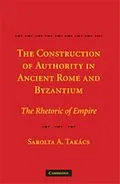In The Construction of Authority in Ancient Rome and Byzantium, Sarolta Takacs examines the role of the Roman emperor, who was the single most important law-giving authority in Roman society. Emperors had to embody the qualities or virtues espoused by Rome's ruling classes. Political rhetoric shaped the ancients' reality and played a part in the upkeep of their political structures. Takacs isolates a reccurring cultural pattern, a conscious appropriation of symbols and signs (verbal and visual) belonging to the Roman Empire. She shows that many contemporary concepts of 'empire' have Roman precedents, which are reactivations or reuses of well-established ancient patterns. Showing the dialectical interactivity between the constructed past and present, Takacs also focuses on the issue of classical legacy through these virtues, which are not simply repeated or adapted cultural patterns, but are tools for the legitimization of political power, authority, and even domination of one nation over another.
Zusammenfassung
This book examines how rhetoric shaped the ancients'' reality and played a part in the upkeep of their political structures.
